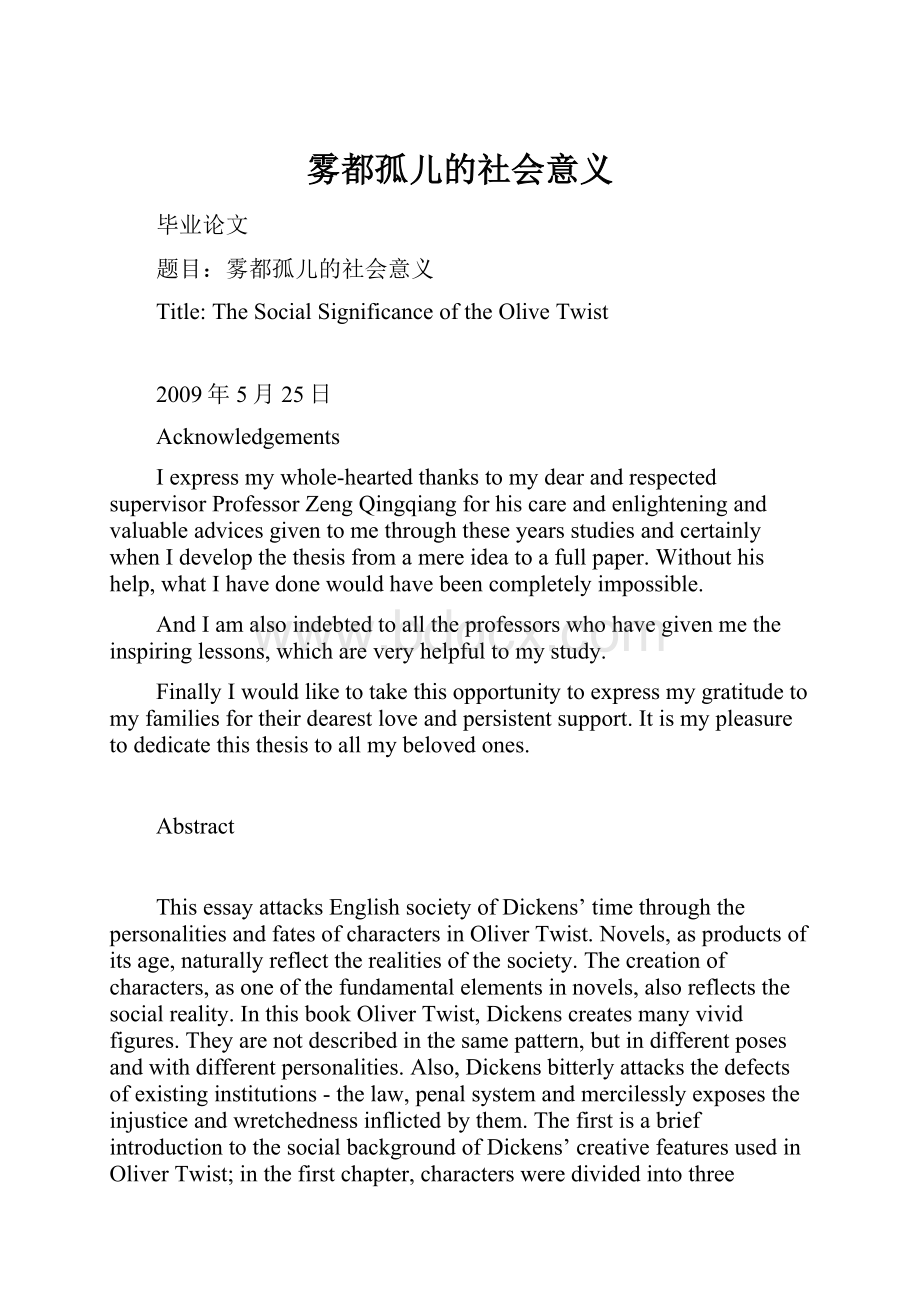雾都孤儿的社会意义.docx
《雾都孤儿的社会意义.docx》由会员分享,可在线阅读,更多相关《雾都孤儿的社会意义.docx(18页珍藏版)》请在冰豆网上搜索。

雾都孤儿的社会意义
毕业论文
题目:
雾都孤儿的社会意义
Title:
TheSocialSignificanceoftheOliveTwist
2009年5月25日
Acknowledgements
Iexpressmywhole-heartedthankstomydearandrespectedsupervisorProfessorZengQingqiangforhiscareandenlighteningandvaluableadvicesgiventomethroughtheseyearsstudiesandcertainlywhenIdevelopthethesisfromamereideatoafullpaper.Withouthishelp,whatIhavedonewouldhavebeencompletelyimpossible.
AndIamalsoindebtedtoalltheprofessorswhohavegivenmetheinspiringlessons,whichareveryhelpfultomystudy.
FinallyIwouldliketotakethisopportunitytoexpressmygratitudetomyfamiliesfortheirdearestloveandpersistentsupport.Itismypleasuretodedicatethisthesistoallmybelovedones.
Abstract
ThisessayattacksEnglishsocietyofDickens’timethroughthepersonalitiesandfatesofcharactersinOliverTwist.Novels,asproductsofitsage,naturallyreflecttherealitiesofthesociety.Thecreationofcharacters,asoneofthefundamentalelementsinnovels,alsoreflectsthesocialreality.InthisbookOliverTwist,Dickenscreatesmanyvividfigures.Theyarenotdescribedinthesamepattern,butindifferentposesandwithdifferentpersonalities.Also,Dickensbitterlyattacksthedefectsofexistinginstitutions-thelaw,penalsystemandmercilesslyexposestheinjusticeandwretchednessinflictedbythem.ThefirstisabriefintroductiontothesocialbackgroundofDickens’creativefeaturesusedinOliverTwist;inthefirstchapter,charactersweredividedintothreecategoriesandtheirsourcesofcreationwerealsoanalyzed;ThesecondchapteristoanalyzethecriticismofDickenstowardsEnglishsocietythroughtheanglesofthelawandthepenalsystem.thethirdchapterisfocusedontheinfluencesbyOliverTwist.
Keyword:
character;fate;Dickens;society;criticism
摘 要
本文通过《雾都孤儿》中人物的性格和命运抨击了当时的英国社会。
小说作为时代的产物,理所当然的反映了当时的社会现实,而人物作为小说的基本要素之一,也不例外。
在这本书中,狄更斯塑造了许多生动的人物形象。
他们造型不同,性格迥异。
同时,狄更斯严厉的抨击了英国现存国家机构,无情地揭露了在这些机构下产生的不公平和不幸的事情。
在前言中介绍了《雾都孤儿》的社会背景和狄更斯的创作特点;第一章人物被分为了三类并对其创作来源进行了分析;第二章从法律和审判制度两个角度分析了狄更斯对英国社会的批判.第三章着重于《雾都孤儿》的影响。
关键词:
人物;命运;狄更斯;社会;批判
Keywords:
figures;
Contents
Introduction…………………………………………………………..1
.CharactersandSourcesofCreation................................................3
1.1.Threecategoriesofmainfigures.……..………….….……...............3
1.2.SourcesofDickens’creation….……..…………………….....6
.TheSocialRealityofThatTime……………….......................8
2.1.ThepoorLaw…………………………………………….....8
2.2.Theworkhouse……………………….............................................9
2.3.Thecriminaljusticesystem…………………………….................11
.AppreciationsandlimitsofCharlesDickens..............................13
3.1.AppreciationsofCharlesDickens.......................................13
3.2.ThelimitsofCharlesDickens……….............................................14
Conclusion………………………………………………….........16
Notes……………………………………………………….........18
Bibliography………………………………………………..........19
Introduction
Atthebeginningof19thcentury,Englandwasrapidlyundergoingatransformationfromagricultural,ruraleconomytoanindustrial,urbannation.Theeconomyofthiscountrywasdevelopingrapidly;thegapbetweentherichandthepoorwasbiggerandbigger.Anewclass—middle-classemerged.InthestratifiedEnglishclassstructure,thehighestsocialclassbelongedtothe“gentlemen,”anaristocratwhodidnothavetoworkforhisliving.Themiddleclasswastheclasswhohadtowork.Inordertoalleviatethestigmaattachedtothewealthymiddleclass,theypromotedworkasamoralvirtue.Becausethemiddleclassfeltinsecurityabouttheirownsociallegitimacyandmanyofthemwereanxioustobedifferentiatedfromthelowerclass,thepoorwassufferedthecrueltreatmentandwasstigmatizedasaclasswhichwaslazyandgood-for-nothings.Earnedwealthwasasignofmoralvirtueintheeyesofmiddleclass;theconditionofpovertywasasignoftheweaknessofthepoorindividual.
ThesentimentbehindthePoorLawof1834reflectedthesebeliefsmentionedabove.TheLawallowedthepoortoreceivepublicassistanceonlyiftheylivedandworkedinestablishedworkhouses.Beggingcarriedthepunishmentofimprisonment.Fortheconditionsoftheworkhousesweredeliberatelymadetobeasmiserableaspossible.Thepoorwouldratherdiequicklythanbeingstarvedbyagradualprocessinthehouse.Thereforemanypoorpeoplewerestarvedinthestreets.
CharlesDickens,thegreatestrepresentativeofEnglishcriticalrealism,wasbornin1812.Atthattime,EnglandwasengagedintheturbulenteventsonthecontinentofEurope.Asaresult,agreatmanycorruptorganizationsandalotofinjusticeappeared.CharlesDickenswasnotsatisfiedwiththesocietyandattackedthesocialrealitywithhispen.OliverTwististhesecondnovelofCharlesDickens,andalsohis masterpiece,andDickenshimselfloveditverymuch.OliverTwist,Thisbookfamousforexposingthedarksidesofpeoplelivedoutthattime.ItexposedthehypocriticalandcrueltyofparishworkhousethroughdepictingthelittleorphanboyOliverTwist’schildhoodinit.Hegaverealisticpicturesofthehorribleexistenceinworkhouse.OneoftheimportantcharacteristicsofOliverTwistwastherealandspecificdescriptionofpeoplewholivedinthebottomofsociety.Theirmiserablelives,includingallthedetails,gavethereadersarealfeeling:
thesewerefictions.Also,itwasthefirsttimethatmanysmallpotatoesappearedinEnglishliterature.
AsoneofthegreatestrepresentativesofEnglishcriticalrealism,CharlesDickenssuccessfullypresentsapictureofthe19thcenturyEnglishbourgeoissocietyindetailofdifferentsocialstatusandpeople;asamasterofstorytellingandcharacterization,heholdsthereaders’attentionwithhisvividplot,horribleorcomiccharacters,andsensationalupsanddownsinhisvividandintimatestyleandlanguage.Withthesuccessfuluseofexaggeration,Dickensgivesthefigurespeculiaritiesintheirphysicalappearancesorintheirmannersofspeechorinsomehabitualactionsorother,anditisthispeculiaritythatlightsuptheirindividualtraitsandmakesthemvividandlively.
Thisnovelrevealsadarkcorruptsociety.Inthisthesis,Iwillfocusoncriticalrealismrepresentedinthisnovelbyanalyzingsomecharactersinthisnovelandattackthedefectsofexistinginstitutions—thelaw,penalsystemandmercilesslyexposetheinjusticeandwretchednessinflictedbythem.
I.ThreeCategoriesofMainCharactersinOliverTwistandTheirSourcesofCreation
Character-portrayalisoneofthemostdistinguishedfeaturesofDickens’works;oneofhisstandingpointsincharacter-portrayalismoral.Therefore,heusuallydividedhischaractersintothreecategories:
positivecharacter,negativecharacter,andmiddlecharacter.Positivecharactersmostlypossessidealmoralfeatures,negativecharactersdonotmostlypossessthesefeatures,whilemiddlecharacterspossessbothkindoffeaturesbutthedividinglineisusuallyquiteclear,andthiskindofcharacterslackthedualnatureofbothgoodandeviland,theobscuritywhichisdifficulttodistinguishthegoodfromtheevil.ThisfeatureinDickens’character-portrayalisfullyreflectedinOliverTwist.
.
ThreecategoriesofmaincharactersinOliverTwist
1.1.1Kind-heartedandvirtuouscharacter
Oliverisaninnocentandbraveorphanboy.Heworkedattheworkhouseasayoungerboyandsufferedalot.Dickenscriticizestheupperclassandtheauthoritieswhotreatthelabour,poorandlowclassverybadly.Fromthewords,wecanknowclearly.
Herosefromthetable;andadvancingtothemaster,basin
Andspooninhand,andsaid:
somewhatalarmedathis
owntemerity;
‘Please,Sir,Iwantsomemore.’
‘What!
’saidthemasteratlength,inafaintvoice.
‘Please,Sir,’repliedOliver,‘Iwantsomemore.’
ThemasteraimedablowatOliver’sheadwith
Theladle;pinionedhiminhisarms;andshrieked
aloudforthebeadle.
‘Formore!
’saidMr.Limbkins.‘Composeyourself,
Bumble,andanswermedistinctly
DoIunderstandthatheaskedformore,afterhehad
Eatenthesupperallottedbythedietary?
’
(CharlesDickens,1997:
10)
Oliver,whoknowswhatshouldbedoneandwhatshouldnotbedonerefusestobeathief.Oliveristhrownintoaworldfullofpovertyandcrime.Thoughsufferingenormouspain,suchashunger,thirst,beatingandabuse,heneverloseshisgoodnature,beingkindandgentletoeveryone.EvenwhenhelearnswhathehassufferedisarrangedbyMonks,hestillagreestosharethewillwithMonks.Inthisway,peopleareimpresseddeeplybytheimageofapoorbutkindorphanandcannothelptenderlylovingthischild.
Olivertalkslessbutobservesandperceivesmore.Heshowshishelplesswhenheisunjustlypunishedanddeniedhisrights.However,whentestedbytheforceofcircumstances,hedisplaysaninnerstrengthentoprotecthimself.Evenwhenevilforcessurroundhim,heremainsunaffected,andhisnaturalgoodnessandinstinctforsurvivalhelphimtoovercometheoddsoflife.Thusheestablisheshimselfintheworldofrespectablepeoplewhocherishthevaluesofhonestyandintegrity.
Inaword,Oliverdoesnotpresentacomplexpictureofapersontornbetweengoodandevil—instead,heisgoodnessincarnate.
1.1.2Cold-hearted,horribleandgrotesque
Faginisacriminalandacorrupterofyoungchildren;heisaJewishimmigrant.ThelawsofthiscountryatthattimerefusedtoallowJewstoholdproperty,sooftenthewaytheymakealivingwaseitherthroughloansor